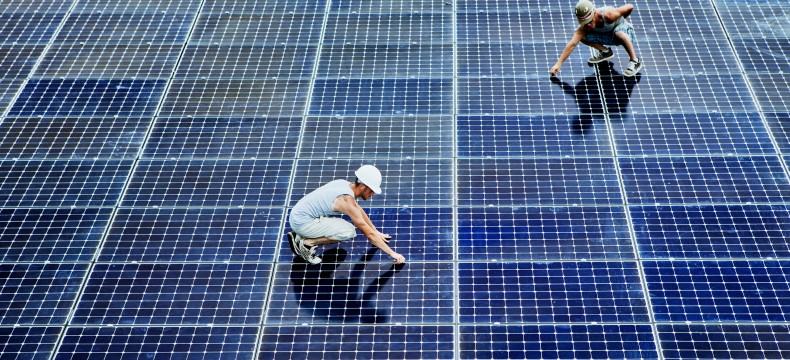ESG, sustainability, transformation, net zero, climate risks and many others are buzzwords that you just can't get past now – the need for change is widely recognized. The real estate industry also is obliged to make its contribution here. The facts are known – rd. 38%[1] of global greenhouse gas emissions and 1/3 of total energy consumption are attributed to the real estate sector worldwide. The major challenge is to connect all those involved — including the public sector, private investors, building contractors, architects, and planners as well as financiers — in such a way that energy consumption, and thus CO2 and greenhouse gas emissions, can be reduced as quickly as possible.
Within the framework of the EU Taxonomy Regulation and challenged by the supervisory authorities such as the ECB, BaFin, but also external auditors and NGOs, there is enormous pressure on the banking industry to act with regard to achieving the sustainability targets that have been set. As part of the financial sector, ING not only want to demonstrate this transformation to a sustainable real estate industry – e.g. only use electricity from renewable sources in buildings since 2020 – but also actively support it through various core competencies. This includes global industry know-how in the real estate sector combined with regional expertise on site, access to the capital markets, networking between industry associations and customers, as well as the constantly expanding understanding of risk taking into account climate change and regulatory requirements.

There are two core products available for our clients in commercial real estate financing.
Green Loan – The “Green Investment Loan”: The purpose is to (re)finance the acquisition of properties that have already been completed and that meet ING’s sustainability criteria at the time the loan contract is signed or will do so in the short term. This means, among others, that the property has a "Class A" energy certificate, is EU taxonomy-compliant or alternatively has a sustainability certificate such as DGNB Gold, LEED Gold, BREEAM Very Good or better.
Even more crucial, however, is the focus on transformation. More than 90% of the real estate portfolio is not sufficiently modernized under energetic criteria and does not or only insufficiently meet the requirements of the EU taxonomy or contributes to the achievement of the Paris climate goals. At the same time, the modernisation rate in Germany is at a very low level of around 1% p.a. based on the entire stock. Here ING wants to support investments in the portfolio, because they are crucial to achieve the set targets. ING's "Sustainable Linked Loan" serves as a suitable financing element for this purpose. Together with the clients, ING defines sustainability criteria/measures, which are firmly agreed in the loan agreement and regularly checked during the term. These so-called KPIs (Key Performance Indicators) have a direct effect on credit costs. If the KPIs are (over)fulfilled, the credit costs fall and vice versa. The KPIs are always defined under the premise of “increasing energy efficiency”. All measures - for example: renewal of the heating and cooling systems, intelligent building control, facade insulation, replacement of lighting with LEDs, etc. - at the property/portfolio level are planned by the client and, if necessary, verified by an independent third party (second party opinion). After all, our professional clients know their property portfolio better than we do. We, ING, support with best-practice examples, as well as sector expertise and deliver the right financing solution.

ING and Hines as a rolemodel
The global real estate firm Hines, in particular its Hines European Core Fund (“HECF”), is a long-standing key client of ING, sharing ING’s green values, and strives to steer towards a carbon-neutral future.
In 2021, ING and HECF agreed on the first of multiple Green Loans, which are in line with the Green Loan Principles. Simone Pozzato, fund manager of HECF:
"As we continue our trajectory to strive to become net zero carbon, our investment strategy focuses on future proofing all assets within our portfolio via responsible and sustainable decision making and action. Integral to our approach is looking at innovative ways to deliver ESG performance hand-in-hand with financial returns for our stakeholders. Our partnership with ING reflects a like-minded partner who aims to push the boundaries when it comes to delivering best-in-class real estate underpinned by best-in-class ESG credentials.“
HECF published its 2021 ESG Review, the fifth annual, in June 2022 disclosing its progress on its transition to net zero carbon, social engagement, and governance. HECF was recognised for its market-leading ESG credentials by achieving a score of 96/100 in the 2021 GRESB survey, confirming its global sector leadership position for an unprecedented fifth year in a row.
ING does not only set ambitious targets for clients but also for themselves: by 2040, ING wants to have steered our loan portfolio to CO2 neutrality.
But the goals of the Paris Agreement cannot be achieved through an energy transformation of the building sector alone. Read in our next issue on 12.10. how we are supporting our clients in the "Utilities" sector.
[1] https://www.worldgbc.org/news-media/launch 2020 Global status report for buildings and construction towards a zero-emissions, efficient and resilient buildings and construction sector



